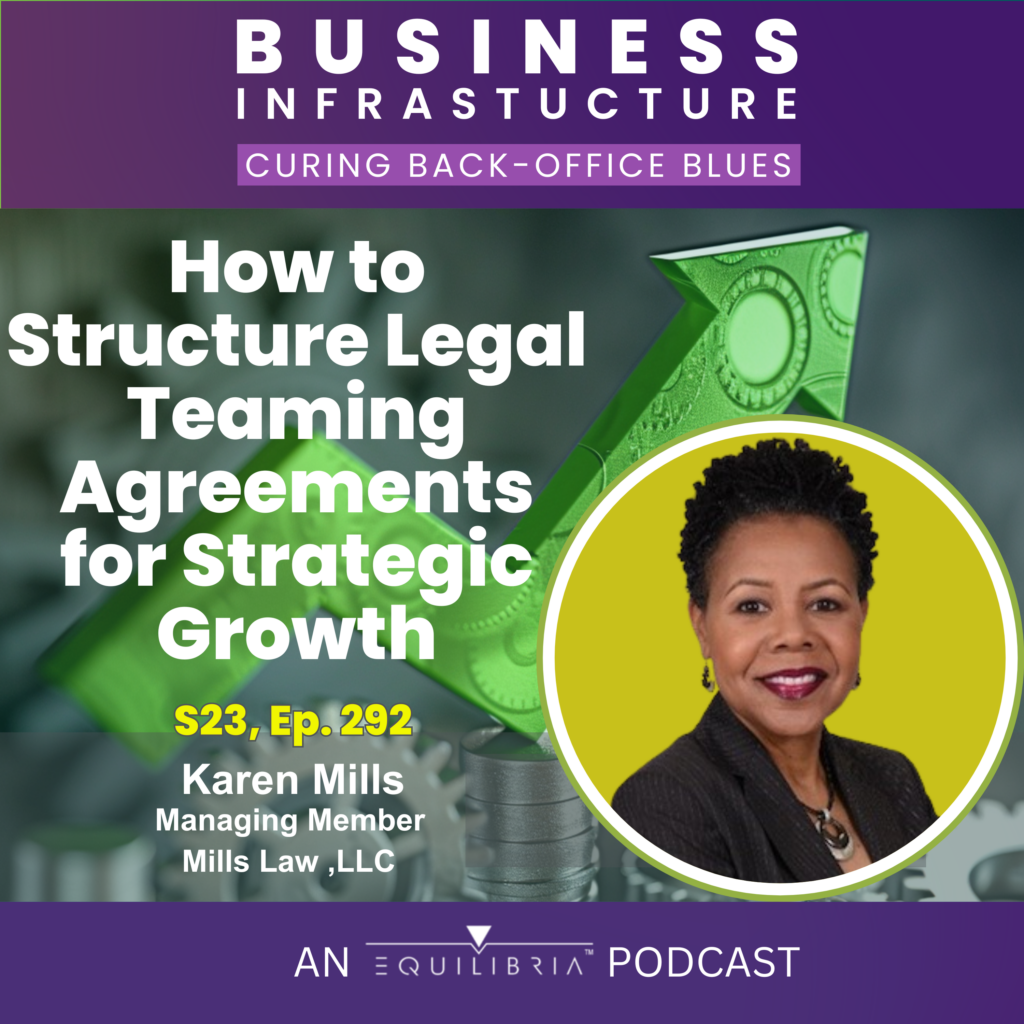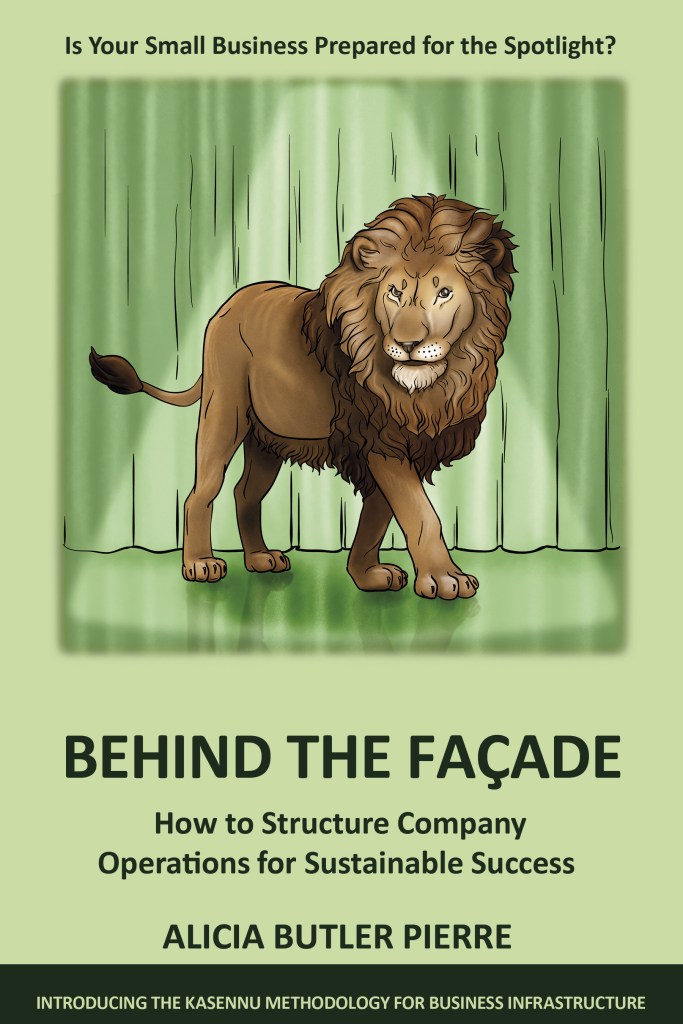Transcript
Welcome back to Season 23 of the Business Infrastructure Podcast – the show where we share operational tips, tactics, and strategies to help you cure any back-office blues you might be experiencing.

I’m Alicia Butler Pierre and we are at the midway point of our masterclass in growth strategies. At this point, we’ve talked about how to vet and validate your ideas for growth, how to create a strategic growth plan that includes validated ideas, and how to develop project plans to implement your company’s growth strategy. Growth comes in many shapes, forms, and scales of magnitude. One way to grow is through partnerships.
And that’s what we’re going to focus on next.
This is Ep. 292: Karen Mills Explains How to Structure Legal Teaming Agreements for Strategic Growth
Karen, I must tell you I am so excited about this episode! Ever since I met you many years ago, I’ve admired your legal acumen. And now here we are – you’ve not only agreed to come onto the show (again), but you’re also actively helping me and my company with forming some key partnerships. I can’t wait for everyone else to hear why I say you’re one of the most brilliant attorneys I’ve ever met. How are you today?
I am doing well, thank you. I’m so glad to be here.
Before we delve into the topic of teaming agreements, I’d like to share a little bit about your bio. You are a founding member of Mills Law, LLC which is a law firm specializing in corporate transactional law, contracts law, technology law, and mediation services. You also founded another company called GIMOS.
And its there where you offer business consulting and training services. I always think its fascinating how people have landed where they are in life when you meet them. Karen, you have a background in electrical engineering, but you’re also an attorney. Considering your specialty in teaming agreements, what type of law did you study?

Well, it’s so funny. It’s that in law school, we always think of it as we all come out of law school knowing pretty much the same thing. Because we’re all taking basically the first couple of years of the same information, and then you have a little bit of flexibility that second year, and then definitely your third year to take more electives. So I figure we all come out knowing the same thing. But I always laugh and say that it was two things that I knew going into law school that I didn’t want to do. I didn’t want to do criminal law, and I didn’t want to do litigation. Now, outside of that, of course, I clerked at a mid-sized firm and at an intellectual property boutique
during the first and second summers of law school.
I actually started off in the patent group. And I ended up working for about the first year and a half on. We had three patent interferences declared at one time. And patent interferences, when you are going to two parties that are what I call fighting over very, very valuable property rights of patents, but it’s patent litigation. So remember, I said two things I didn’t want to do going to law school. So when I got stuck doing that patent litigation for about a year and a half, I was so over it. So they moved me into corporate mergers and acquisitions. Well, that’s how I started doing corporate transactional contracts and business law.
When I moved into corporate mergers and acquisitions, I started understanding better the financial decisions going behind why to pursue certain patents and doing certain things. So, I ended up really liking the transactional aspect of things. I now like to help entrepreneurs and business owners. I help them form their entity, and I also will help them sell their entity as well. And a lot of things in between, and a lot of things in between is usually contract review, negotiation, and drafting. So that’s kind of how I summarize what I do. And I thought about it a few weeks ago. I’m actually getting ready to start my 25th year of the practice of law.
Wow, 25 years?! That’s amazing! Well, congratulations.
Thank you.
Now part of that 25 year journey as an attorney not only included your stint working for other law firms but also starting your first firm, which, ironically, involved a partnership with another attorney. And since 2011, you opened your own firm. What I find interesting is your previous partnership. It’s a great segue into the topic of teaming agreements, starting with mergers and acquisitions. It might surprise some listeners to know that Mergers and Acquisitions (or M&As) can happen between two small companies, right?
That’s correct.
So, what is a Merger and Acquisition and how it is different from a teaming agreement?

When you’re talking about mergers and acquisitions, it’s typically where you might have one entity that is interested in acquiring all of the assets, everything of another entity. Or they may not necessarily want to acquire all aspects of it, maybe just certain ones. So instead of where you have one entity, I’ll take it and merge it in with another, where it becomes part of that particular organization. It’s only certain aspects or certain visions of it that that particular buyer might be interested in. But when you’re talking about teaming with other individuals or other entities, you’re both running your own companies.
And you jointly agree to be able to manage or operate. You could operate a separate legal entity as well. Or, you can have your company and the other individual has their company and you’re coming together and you are going to jointly produce a particular product or perform a particular service.
You can also have certain scenarios where you have individuals and companies come together to even do things like joint venture, where someone may act as a potential prime contractor and have subcontractors under them to help actually produce products or perform services as well. So you kind of have a variety. I often say, I think of it as teaming relationships. You’re teaming together.
And when you say teaming, you can be the joint venture. You can have that prime contractor subcontractor relationship, or you can have a subcontractor who uses another subcontractor. So, it’s amazing to me all the different types that you can have, but what you’re doing is you’re coming together for a particular purpose. When I’m talking to people about teaming, I say, “I don’t know why people are often hesitant to team. I would like to have a little sliver of a big pie rather than 100% of zero, which I might have if I try to do it by myself.”
Amen to that, Karen! In fact, I told my team that my word for this year, 2024, is “partnerships.” My philosophy is 10% of something is better than 100% of nothing. You can do more together than you can individually. Get your pride or ego out of the way and explore partnerships.
That’s exactly right.
Karen, I’m sure there is someone listening who may be thinking, what do you call the actual contract when you find an entity that you want to partner or team with? Is it called a teaming agreement contract?

Oftentimes, for instance, when we say a teaming arrangement and a teaming agreement, it might be called that if that’s what the parties desire to call it. Or, it might be called a joint venture agreement, right. If that’s how the partners desire. Or, where you have the prime contractor subcontractor relationship, it could be like an independent contractor agreement. A lot of times I tell my clients, don’t necessarily get caught up in what you call the agreement.
What we need to make sure of is what terms are in that agreement and make sure that they end up being mutually beneficial for both parties. And when I say mutually beneficial, please understand, I’m not saying that it has to be 50/50 all the way through. The benefits need to be 50…no, when you say mutually beneficial, sometimes that mutual benefit might be 90% for one party, 10% of the other. But you are benefiting from it in some way, shape, form, or fashion.
That’s what our teaming agreement looks like here at Equilibria. We are partnering with other organizations that have relationships in the U.S. federal government and large corporate enterprise spaces that we don’t have. When we submit proposals, they will act as the Prime Contractor, taking a management fee and Equilibria will act as the sub-contractor getting the remainder of the fees. And its taken a while to work through the mechanics of the contract. I know not all situations are the same, but Karen can you explain the generic process for constructing a teaming agreement for your clients?
I always like to have initial discussions with my clients so that I can understand what are their goals regarding whatever it is when we say this teaming relationship? What are the goals in it? And then what? Also thinking through, will you keep your entity? They keep their entity? You’re coming together just to be able to perform or to produce certain things? Or will it be that you will have a totally separate legal entity, and we go through the formal process of actually forming that entity?
And when we do that, are you going to own it in your individual capacities, or will you own it if you already have an existing entity and that entity will end up being the owner? Those are very important things. Because we want to make sure of who are going to be the legally binding parties of that particular arrangement, because we want to make sure that that is crystal clear up front so that everybody can be on one accord about it.
And I often will tell my clients when they are doing this, make sure that you have had discussions with your business tax accountant regarding these matters, because whenever you’re talking about entity formation and even with these particular relationships, make sure your accountant is aware of this so that they can maybe give you some best practices and best strategies for how you would enter into this relationship so that it can be mutually beneficial for you tax wise.
Because usually what we’re talking about here are for-profit entities and these for-profit entities are trying to make profit and you want to make profit by trying to minimize your tax liabilities and other liabilities. So, I think it’s always so key to make sure that you talk with your business tax accountant and have them on board with what you’re doing so that you can have a good firm foundation going forward and a good strategy for entering into these relationships.
And I can speak from experience. Please heed Karen’s warning! ALWAYS check with your tax accountant whenever you make any change to the way your business operates. For example, we had to change our classification from an S-corp to a C-corp this year due to operational changes that led to us making more money last year. That’s a great thing, but it meant different tax implications. Sorry for that diversion. Please, Karen, continue.

And so once you have that done, then I know often my clients kind of look at me sideways when I mention, let’s talk about how we’re going to terminate this relationship. And they’re like, “Terminate? We are just talking about getting started!” Yes, but we want to talk about that on the front end when everybody is super excited about the perceived pot of gold at the end of the rainbow.” We want to make sure that everybody is clear because understand that every individual does not agree on everything. I don’t care how good friends you are or that it might be a familial relationship.
It’s just certain things you may not agree on. And, sometimes you may not know about these individuals or the entity strategies until you’re in the trenches working with them side by side on a daily basis. And it may be that just your styles do not mesh. It may be that they are not doing anything illegal, immoral, or unethical. It’s just like, Um, I don’t like that. I like to do something this way and I like to do this one this way so have a way out for that. Make sure and everybody be clear on that way out before you ever enter into it. What if I say, “This isn’t really working for me and according to what we agreed upon, and we have it in our agreement, is that if I give you written notice, then 30 days after that it’s over.”
And then of course, we want to make sure that we have addressed, Do they get any monies that if they did capital contributions? You want to know that up front so that everybody is clear if it’s going to terminate, what is going to happen. Like I said, I’ve seen it too many times where people or entities didn’t address that up front and then it’s a nightmare when this is not working. What is it that we should do? And when people are often upset with each other, it’s definitely hard for them to agree to let’s part ways this way. So, let’s do it when everybody is happy.
That makes a lot of sense. We have an expression here in America, “Laying your cards out on the table.” In other words, address how to handle issues upfront. Because this is the business infrastructure podcast, we focus on the people, processes, and tools required to scale operations. Karen, so far you’ve told us about some initial questions you ask your clients to start the process of drafting a teaming agreement. I know you have a very detailed list of questions that you share. These are questions about things you would never even think of, but it’s better to think of those things ahead of time and work it into your teaming agreement, right?
Yes, that’s exactly right. For instance, say intellectual property is involved. And when I say that, are we talking about someone that has patent rights or any copyrights or any trademarks, things like that? Who owns it, that intellectual property? Is it going to be assigned to whatever the teaming relationship is going to be, or is it going to remain the property of whoever it is that’s contributing to it? And if it’s in the early stages, who’s going to pay for the development of it? Are there going to be licenses granted upon that, what are the costs that are going to be associated with development?
And from what I understand, these considerations can apply to other areas as well, right?
You can substitute services or products for it. Think through what will it take to be able to develop those items? What are the costs? Who will market those? How’s the pricing going to be determined? Let’s think about budget. Because we all know it takes money to make money. And too often I see that the parties will decide as what is the initial capital contribution? But let’s think about it. We are all excited about the possibilities of people either purchasing our product or we’re getting contracts for those goods or services. But it may take a while for you to ever actually achieve those first sales, so who’s going to be contributing the additional capital if there’s needed?
And will that be a mandatory contribution required? Or if it’s not mandatory, will one individual be stuck having to fund everything? And can you withdraw capital? And if so, what are the requirements for that? If you get to the point where there are profits, how will those be divided? And we also have the time period where there may be losses. How are those going to be divided? Who’s going to be responsible for the books and records of the organization?

During the teaming arrangement is it one party said they are going to provide the employees or independent contractors and then somebody else is supposed to do something else? They may be supplying equipment. What will be the roles and responsibilities of each of the parties? And if those parties don’t do what they say they’re going to do, actually breach, what the obligations are, what’s going to happen? Do they forfeit their rights in the company or what will be those penalties?
What if somebody decides they want to terminate or withdraw from it? What is allowed regarding it? Will they receive any monies back? Is notice required? What happens? What are those circumstances for which you want to allow that? How about if someone decides, Oh, you know what, I want to sell my interest in the teaming arrangement? Well, do you want it to be such that the other party, the non-selling party, do they get a right of first refusal regarding that particular member’s interest or what happens? What happens if people die or become disabled? Let’s think through, What are some of those scenarios? What happens?
Wow! This is what I alluded to earlier. There are SO many things to consider. Karen, earlier you mentioned the protection of intellectual property, but what about the protection of confidential information?
When you’re in a teaming arrangement typically you are going to be probably sharing some very confidential information. Regarding your pricing, your product, your clients, your vendors, your suppliers. They’re getting exposed to your employees and your independent contractors. Are you going to make sure that you have restrictive covenants regarding non-competition, as well as non-solicitations that they won’t be able to solicit your customers, your clients or your employees? Think through those.
What if there is a breach of a warranty or a particular obligation and indemnification is going to be required because, but for your actions now I’m being sued, so should I be indemnified for that because of your actions and all? Can people use subcontractors or not? And if so, would they need your permission in order to be able to do this? So those are just a few of the many things that you often think about when you are forming these particular relationships.
It’s clear that a solid teaming agreement requires much customization. Is it possible for people to go online to get a generic agreement?
I don’t hate on the concept of just pulling a form online. However, you need to make sure that you read that contract in its entirety. I mean, from every word, from beginning to end, because you really need to understand those terms and conditions because each item, every word counts and each of those provisions matter. And don’t ever overlook things just like those provisions that are typically towards the end of the contract.
What people say, “Oh, a miscellaneous provisions or boilerplate,” that might be one that has governing law. People might say, “Oh, that doesn’t matter. It’s just whatever state.” Well, let me tell you when it does matter, because if it is problematic and the litigation is required, now here you are. Maybe you partnered up and teamed with an organization or entity that’s based out of California and you let California law govern and then you’re going to be subject to jurisdiction, maybe in California.

Well, now you’re here in Georgia, so that means you’re likely going to have to obtain California council and may have to appear there. So that means flights to California. So think through those provisions when you are in those early negotiation stages. What are the long term effects of some of these things? They’re not just words on paper because these things can really impact your life and they can be very time consuming.
This has my head spinning! I don’t want anyone to walk away from this interview being scared because knowledge is power! If we circle back to your contract drafting process…once you’ve reviewed that robust list of questions you have with your clients, you then provide an initial draft of the contract.
Again, from experience in working with you, I know that there can be several iterations of that contract based on further discussions. But once it’s finalized, your client is free to send that contract to the other entity. Are there times when even more iterations to the contract may be required due to pushback from the other entity?
Oh, yes, in a major way because it depends on who I’m representing. If we got Company A and Company B, and I’m representing Company A and Company A has been charged with turning the initial draft of the document and when you’re going to submit it to Company B for review. Well, I’m representing company A, so I’m going to make sure that all of the terms are typically going to be favorable to company A, and it’s up to Company B or its counsel to actually review it and determine what of that agreement is problematic to them.
It is not Company A or Company A’s lawyer’s responsibility to tell you what’s wrong with that contract and why it doesn’t benefit you. That’s not how it works. And I often tell people that all the time. When you receive a contract from the opposing party, you should expect for it to be one sided in favor of the party that is delivering the contract to you. That’s your job, your duty, your responsibility to review that contract and let them know what’s problematic. And yes, it happens quite often.
And they say, because, of course, if I send it over where indemnification might be just unilateral in favor of my client, I would expect that, especially with the teaming of relationship, you’re like, no, it needs to be mutual, or where you have to indemnify us as we indemnify you. So, I would definitely expect that. Always remember, when it comes to, especially written agreements, they are made to be modified. Contracts are made to be amended. I have more respect for you if you tell me you don’t want to amend it. But don’t tell me it can’t be.
So, I’m going to draft in such a way that I also want to make sure that it’s fair and I’m going to follow your lead on all of that because if we receive it from the other side and they have some changes, those that seem to be pretty reasonable and that you are okay with, because we will walk through those and we’ll talk about what are the consequences of making those changes. And if you feel like these things are fair, we can include them.
Those that we think are not fair, then we say that. And that’s when we have to understand, well, is this one of those what you might consider a deal killer where if they don’t want to do x, then it’s a no go. But I think we also have to think through what are those scenarios that will cause that particular thing to occur? But most of the time expect for, yes, other opposing party will have certain comments, certain things that they want changed, and that’s just a normal process of negotiations in these teaming relationships.
At this point, we’ve covered the process element of business infrastructure. What about the people element? You mentioned working with a tax accountant, and obviously an attorney like you. But what exactly should we look for in an attorney? What would be that person’s title?

Somebody that usually is dealing with corporate transactional related projects or they say a contracts attorney. And sometimes when you hear people that use the term business attorney, but you kind of nail that down a little bit more to find out, Okay, do you have experience with drafting certain types of agreements? And then that’s when you would find out that kind of information and determine if that is the right trusted advisor for you.
And what about the tools and technology element of business infrastructure?
You know, the whole Microsoft suite. And then sometimes, of course, you’re using the services that they have to be able to share documents back and forth. That might be much easier. And you can do those and you can secure those as well. That’s about it that I utilize, if that makes sense.
Another tool is that infamous checklist of questions you present to your clients. Do you have that available in an online format that can be shared?
Well, I actually don’t have it up. What happens is when I usually offer like a free 15 minute discovery session potential client, and I follow up by sending them a copy of it. So that’s how I usually kind of keep control of it.
Protecting your own IP. I love it! Karen, where can people find more information about you and your companies?
At the end of 2022, I formed the consulting firm Gimos, LLC. And the reason why I formed the consulting firm is because when I would approach very large organizations who have great and very huge constituency base, I would approach them about trying to provide educational training regarding contracts, these teaming arrangements. Because over these 25 years of just seeing what things entrepreneurs and business owners don’t know because everybody’s not necessarily ready for legal. I wasn’t trying to approach them to promote my law firm, I just wanted to do the training through the law firm.
So, I formed my consulting firm so that now that’s where I do my training. And one of the things that I created as part of this consulting firm, I created an online membership-based community, and it’s called Practically Legal Lifestyle. And that name came about twofold.
I was talking with another colleague about the D-I-Yers out here who are doing things themselves, don’t know really what they’re doing, and they’re practically legal. And the other side of it is that we understand and recognize that business owners and entrepreneurs, they need practical legal and business information, because when you seem to understand those things in a practical way, you’re like, “Oh, I get it now. I get it, why I need to talk about termination before I enter into things.”
Well, everything you are doing to support the small business community in legal education and contract formation is much appreciated. Karen, as we wrap up do you have any final words of wisdom regarding teaming agreements and growth strategies?

Okay, I would say a few things here. Trust but verify. I understand that because we’re trusting by nature, but you need to verify all of the information that someone is sharing with you. And keep in mind, people of integrity and good character will never have a problem putting what they say in writing. So, if ever you find an individual or entity that’s hesitant to put what they’re telling you verbally in writing, that ought to raise a red flag. And then finally, please understand, the courts are full of people who they were trusting of each other, right?
But now they’re in the midst of litigation because things turn bad, and they typically turn bad very quickly. Don’t be flattered by people and entities that want to do business with you, because sometimes they’re actually looking for their next victim. And you might be it. You might be it, because you’re not going to review the contract. You’re going to believe everything they say and not verify it yourself.
So you end up being the next victim. They make all kinds of money off of you, and they know that typically you might not have the resources to be able to pursue a litigation action against them. And so now you’ve done free work, and they have just gained all access to those things, and you were trusting of them. So I want to make sure you understand, please don’t be the next victim.
Well, on that note, Karen, I cannot thank you enough for coming back onto the show, sharing all of these pearls of wisdom. This was fantastic!
Thank you for having me. You have been a good friend and a great client. So, if ever you need me back, I’m here to be able to educate, equip, empower.
Thank you for that, Karen and thank you for listening! If you’d like to connect with Karen, then be sure to visit BusinessInfrastructure.TV. There, we’ll have a link to her LinkedIn profile as well as her online community and an upcoming workshop she’s giving on patent protection. Again, you can find this information in the show notes at BusinessInfrastructure.TV.
If you enjoyed this episode, then please subscribe, give us a five-star rating, and leave us a review.

Join me in the next episode where I’ll share how we here at Equilibria worked with Karen to develop teaming agreements based on key strategic partnerships outlined in our X-matrix and project plans. Be sure to come back to the place wherever you’re listening so you don’t miss this next episode!
Until then, remember to stay focused and be encouraged. This entrepreneurial journey is a marathon and not a sprint. This podcast episode was written and produced by me, Alicia Butler Pierre. Audio editing by Olanrewaju Adeyemo. Original score and sound design by Sabor! Music Enterprises. Video editing by Gladiola Films. A special thank you to our sponsor, Equilibria, Inc., and to Grant Revilla for creating the show notes.
This is the Business Infrastructure – Curing Back-Office Blues podcast.



















